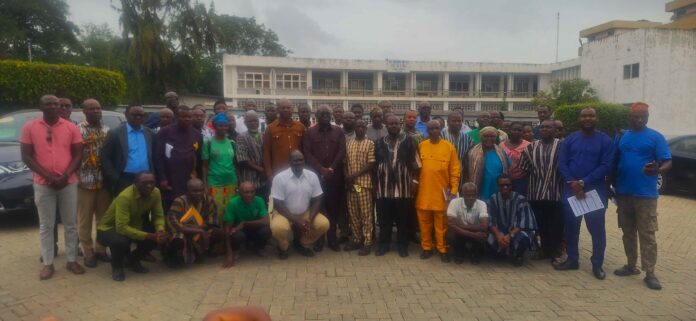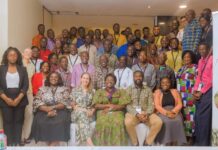The Peasant Farmers Association of Ghana has engaged the stakeholders in collaboration with the Ministry of Food and Agriculture (MoFA), the African Union Commission and ECOWAS Commission had engaged on sensitization and awareness creation on the newly adopted Comprehensive African Agriculture Development Programme (CAADP) framework (Kampala Declaration).
To welcome the stakeholders to the programme, the Executive Director, Peasant Farmers Association of Ghana, Bismark Owusu Nortey said the gathering is to foster collaboration, and strengthen the role of non-state actors (NSAs) in shaping agricultural and agri-food systems policy in Ghana and across Africa.
He mentioned that for the two decades, the Maputo Declaration (2003–2014) and Malabo Declaration (2014–2025), revitalizing agriculture to reduce malnutrition and accelerating agricultural growth and transformation to achieve shared prosperity respectively has elapsed.
“As Africa approach the conclusion of the Malabo era, the African Union has adopted a new ten-year framework, ‘The Kampala Declaration (2026–2035)’, which embraces an agri-food systems approach”, he added.
According to him, the Kampala Declaration calls for multi-sectoral coordination, increased investment, and innovation to drive sustainable, resilient, and inclusive transformation. Its vision is bold: diversify economies, create millions of local jobs, raise incomes, and foster social cohesion and stability.
To achieve national goal of Ghana’s Agriculture for Economic Transformation Agenda (AETA) with the Feed Ghana Program (FGP) as its core represents the latest policy direction. While it brings renewed hope and enthusiasm, it is also a moment for reflection, given our experiences with past initiatives.
“The Comprehensive Africa Agriculture Development Programme (CAADP) serves as the overarching framework guiding the continent, ECOWAP as the regional guide, and our domestic policy the Feed Ghana Programme as the vehicle we will ride on towards agricultural success in Ghana”, Wepia Addo Awal Adugwuala, the National President Peasant Farmers Association of Ghana (PFAG) added
Although Ghana has been a dedicated signatory to the CAADP since 2003 by recognizing its power to transform the agricultural landscape, Ghana has been largely disappointing for fulfilling her CAADP commitments.
Giving statistics of Ghana’s commitments to CAADP over the years, he explained that the data from the 2023 ECOWAS Agriculture Joint Sector Report shows a declining trend in government allocation to agriculture: 6.2% in 2019, 5.7% in 2020, and 4.5% in 2021, averaging 5.5% over the period. In 2023 and 2024, the allocation further dropped to 1.95%, and in the 2025 budget, it fell to an all-time low of less than 1%.
However, he said with the introduction of the Feed Ghana Program, under the Agriculture for Economic Transformation Agenda, presents a new opportunity and hope to change the narrative.
He commended the Minister for the instantaneous response to the farmers needs and called for immediate attention to resolve the post-harvest loss, inability to access formal credit, inadequate agricultural infrastructure, high costs of input, and poor marketing systems as the challenges affecting the smallholder farmers.
To crown it all, the Minister of Food and Agriculture, Hon. Eric Opoku said the Malebo Declaration thus, CAADP aligned perfectly with the Feed Ghana Programme implemented with the focus of feeding the people of Ghana and the agro-industries.
Minister acknowledged the endowment of the agriculture potentials being land, water bodies, youthful population, market; Africa has a population estimate around 1.5b, and fortunately the headquarters of AfCFTA is in Ghana, however, quizzed why Ghana is importing food over $3b annually to supplement local production?
“It is time for us to put in place the necessary mechanisms to change the story so that we can boost food production, create sustainable employment for the youth and also gender sustainable growth,” Hon. Minister added.
With the Feed Ghana Programme and its modules, it is possible to achieve food sustainability, wealth creation and economic growth.
He called on the farmers especially the peasant farmers to comply with the modules to help support the government to achieve food security in the country.








